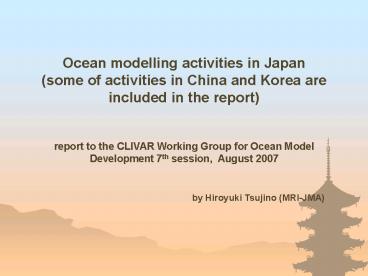Ocean modelling activities in Japan - PowerPoint PPT Presentation
1 / 7
Title:
Ocean modelling activities in Japan
Description:
with high-resolution CGCM (60 km AGCM, 20 km OGCM) ... to achieve higher resolution ... hierarchy of the North Pacific models differing in horizontal resolution ... – PowerPoint PPT presentation
Number of Views:23
Avg rating:3.0/5.0
Title: Ocean modelling activities in Japan
1
Ocean modelling activities in Japan (some of
activities in China and Korea are included in the
report)
report to the CLIVAR Working Group for Ocean
Model Development 7th session, August 2007
by Hiroyuki Tsujino (MRI-JMA)
2
- Updates on oceanic components of global climate
models for the next IPCC future climate
projections
FRCGC and CCSR Centennial time-scale climate
projection with Earth System Model, NPZD
ocean eco-system, 1-deg. resolution
CCSR, FRCGC, and NIES Decadal time-scale
climate projection (prediction) with
high-resolution CGCM (60 km AGCM, 20 km OGCM)
updates on some schemes and physics (advection,
ice-thermodynamics)
common coupler (atmosphere, ocean, chemicals)
designed for ES to facilitate comparison
MRI-JMA Centennial time-scale climate
projection with Earth System Model, ocean
bio-geochemical model, 1-deg. resolution
Emphases on assessment of regional impacts using
time-slice runs (regional climate model with
10 km ocean model)
3
Activities are Focused on ...
- Updating oceanic components of global climate
models for the next IPCC future climate
projections - Developing systems for seasonal to inter-annual
(or longer) climate predictions - Updating regional ocean models for use in
regional marine environment forecasts
- Two research centers in China (LASG, BCC) are
preparing for IPCC AR5. - They are managing their own OGCM
(eta-coordinate). - FIO couples wave model with existing OGCMs to
obtain vertical diffusion
- There does not seem to be major institutional
effort in Korea right now. - The APEC computer center will be build in Korea.
4
- Systems for seasonal to inter-annual (or longer)
climate predictions
MRI-JMA ... ENSO (seasonal) forecast TL95L50
and 1 degree Ocean, 3D-VAR ocean data
assimilation CGCM with on-line 3D-VAR data
assimilated ocean
FRCGC and CCSR ... Decadal projection 60 km
AGCM and 20 km OGCM, Ensemble Kalman Filter
data assimilation for ocean and surface wind
- Updating regional ocean models for use in
regional marine environment forecasts
FRCGC (POM), MRI-JMA(MRI.COM), RIAM (RIAMOM),
Kyoto Univ.
Currently about 10 km grid spacing for relatively
large region, physics only
Efforts to include additional processes
(biogeochemistry) to achieve higher
resolution ...
5
4. CORE
Inter-annual forcing run FRCGC, CCSR
long-term variablity is reproduced well, mostly
driven by wind stress anomalies
Normal year forcing MRI-JMA some would
prefer using another re-analysis (e.g.,
ERA, JRA (by JMAs AGCM)) complaining about
Equatorial thermocline (wind stress),
Hawaiian lee precipitation (FRCGC-CCSR,
per. comm.) radiation in the Arctic region
6
Need for the tracer advection scheme suitable to
eddying simulations new advection scheme
SOM, and/or tuning of the anisotropic GM
SOM is recently introduced and implemented in
Japan community
Quasi-global ocean only model with 1/8º x 1/12º
(10 km)
gt recently globalized
GrADS software option PDEF to quicklook on
regular grid
hierarchy of the North Pacific models differing
in horizontal resolution
1/4x1/6
1/12x1/18
1/36x1/54
7
Two-way nesting ocean in CGCM (CCSR and MRI-JMA)
Low resolution model predictor corrector ?
data assimilation robust diagnostic / semi
prognostic
conservation of volume, tracer, in both models?
sustainable (not ad hoc) software (or run on
separated CPUs)
Sharing of program codes
recently turned out to be too difficult to be
united or shared
Next generation code
C-grid, unstructured mesh, adaptive mesh, which
should we choose?































